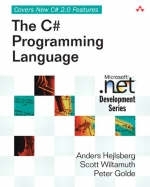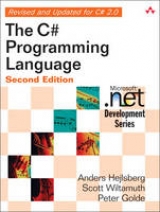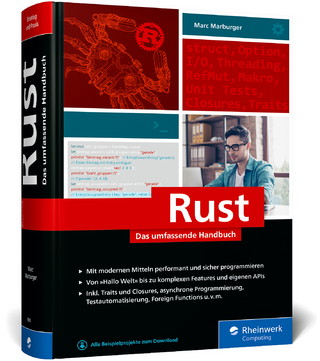
The C# Programming Language
Addison-Wesley Educational Publishers Inc (Verlag)
978-0-321-15491-0 (ISBN)
- Titel erscheint in neuer Auflage
- Artikel merken
Written by the language's architect and design team members, The C# Programming Language is the definitive technical reference for C#. Moving beyond the online documentation, the book provides the complete specification of the language along with descriptions, reference materials, and code samples from the C# design team. This academic version of the book comes with a complimentary 90-Day trial of the SDK CD for the C# language.
Anders Hejlsberg is a programming legend. He is the architect of the C# language and a Microsoft Technical Fellow. He joined Microsoft Corporation in 1996, following a thirteen-year career at Borland, where he was the chief architect of Delphi and Turbo Pascal. Scott Wiltamuth is General Manager for the Visual Studio Language and Data Tools team at Microsoft Corporation. In his thirteen years at Microsoft, he has worked on a wide range of development tools, including OLE Automation, Visual Basic for Applications, VBScript, JScript, Visual J++, and Visual C#. Before leaving Microsoft Corporation, Peter Golde served as the lead developer of Microsoft's C# compiler. As the primary Microsoft representative on the ECMA committee that standardized C#, he led the implementation of the compiler and worked on the language design.
Preface.
I. C# 1.0.
1. Introduction.
Hello World.
Program Structure.
Types and Variables.
Expressions.
Statements.
Classes and Objects.
Structs.
Arrays.
Interfaces.
Enums.
Delegates.
Attributes.
2. Lexical Structure.
Programs.
Grammars.
Lexical Analysis.
Tokens.
Preprocessing Directives.
3. Basic Concepts.
Application Startup.
Application Termination.
Declarations.
Members.
Member Access.
Signatures and Overloading.
Scopes.
Namespace and Type Names.
Automatic Memory Management.
Execution Order.
4. Types.
Value Types.
Reference Types.
Boxing and Unboxing.
5. Variables.
Variable Categories.
Default Values.
Definite Assignment.
Variable References.
Atomicity of Variable References.
6. Conversions.
Implicit Conversions.
Explicit Conversions.
Standard Conversions.
User-Defined Conversions.
7. Expressions.
Expression Classifications.
Operators.
Member Lookup.
Function Members.
Primary Expressions.
Unary Operators.
Arithmetic Operators.
Shift Operators.
Relational and Type-Testing Operators.
Logical Operators.
Conditional Logical Operators.
Conditional Operator.
Assignment Operators.
Expression.
Constant Expressions.
Boolean Expressions.
8. Statements.
End Points and Reachability.
Blocks.
The Empty Statement.
Labeled Statements.
Declaration Statements.
Expression Statements.
Selection Statements.
Iteration Statements.
Jump Statements.
The try Statement.
The checked and unchecked Statements.
The lock Statement.
The using Statement.
9. Namespaces.
Compilation Units.
Namespace Declarations.
Using Directives.
Namespace Members.
Type Declarations.
10. Classes.
Class Declarations.
Class Members.
Constants.
Fields.
Methods.
Properties.
Events.
Indexers.
Operators.
Instance Constructors.
Static Constructors.
Destructors.
11. Structs.
Struct Declarations.
Struct Members.
Class and Struct Differences.
Struct Examples.
12. Arrays.
Array Types.
Array Creation.
Array Element Access.
Array Members.
Array Covariance.
Array Initializers.
13. Interfaces.
Interface Declarations.
Interface Members.
Fully Qualified Interface Member Names.
Interface Implementations.
14. Enums.
Enum Declarations.
Enum Modifiers.
Enum Members.
The System.Enum Type.
Enum Values and Operations.
15. Delegates.
Delegate Declarations.
Delegate Instantiation.
Delegate Invocation.
16. Exceptions.
Causes of Exceptions.
The System.Exception Class.
How Exceptions Are Handled.
Common Exception Classes.
17. Attributes.
Attribute Classes.
Attribute Specification.
Attribute Instances.
Reserved Attributes.
Attributes for Interoperation.
18. Unsafe Code.
Unsafe Contexts.
Pointer Types.
Fixed and Moveable Variables.
Pointer Conversions.
Pointers in Expressions.
The fixed Statement.
Stack Allocation.
Dynamic Memory Allocation.
II. C# 2.0.
19. Introduction to C# 2.0.
Generics.
Anonymous Methods.
Iterators.
Partial Types.
20. Generics.
Generic Class Declarations.
Generic Struct Declarations.
Generic Interface Declarations.
Generic Delegate Declarations.
Constructed Types.
Generic Methods.
Constraints.
Expressions and Statements.
Revised Lookup Rules.
Right-Shift Grammar Changes.
21. Anonymous Methods.
Anonymous Method Expressions.
Anonymous Method Signatures.
Anonymous Method Conversions.
Anonymous Method Blocks.
Outer Variables.
Anonymous Method Evaluation.
Delegate Instance Equality.
Definite Assignment.
Method Group Conversions.
Implementation Example.
22. Iterators.
Iterator Blocks.
Enumerator Objects.
Enumerable Objects.
The yield Statement.
Implementation Example.
23. Partial Types.
Partial Declarations.
Name Binding.
III. APPENDIXES.
A. Documentation Comments.
Introduction.
Recommended Tags.
Processing the Documentation File.
An Example.
B. Grammar.
Lexical Grammar.
Syntactic Grammar.
Grammar Extensions for Unsafe Code.
Index.
| Erscheint lt. Verlag | 13.11.2003 |
|---|---|
| Verlagsort | New Jersey |
| Sprache | englisch |
| Maße | 196 x 239 mm |
| Gewicht | 1180 g |
| Themenwelt | Mathematik / Informatik ► Informatik ► Programmiersprachen / -werkzeuge |
| Mathematik / Informatik ► Informatik ► Web / Internet | |
| ISBN-10 | 0-321-15491-6 / 0321154916 |
| ISBN-13 | 978-0-321-15491-0 / 9780321154910 |
| Zustand | Neuware |
| Haben Sie eine Frage zum Produkt? |
aus dem Bereich



